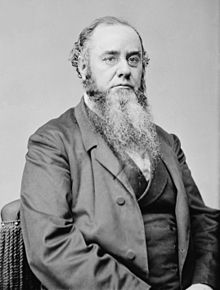Edwin Stanton | |
|---|---|
 Photograph c. 1866-1869 | |
| Associate Justice of the Supreme Court of the United States-Designate | |
| In office Died before assuming office | |
| Nominated by | Ulysses S. Grant |
| Preceded by | Robert Cooper Grier |
| Succeeded by | William Strong |
| 27th United States Secretary of War | |
| In office January 20, 1862 – May 28, 1868[Note 1] | |
| President | Abraham Lincoln Andrew Johnson |
| Preceded by | Simon Cameron |
| Succeeded by | John Schofield |
| 25th United States Attorney General | |
| In office December 20, 1860 – March 4, 1861 | |
| President | James Buchanan |
| Preceded by | Jeremiah Black |
| Succeeded by | Edward Bates |
| Personal details | |
| Born | Edwin McMasters Stanton December 19, 1814 Steubenville, Ohio, U.S. |
| Died | December 24, 1869 (aged 55) Washington, D.C., U.S. |
| Resting place | Oak Hill Cemetery, Washington, D.C., U.S. |
| Political party | Democratic (before 1862) Republican (1862–1869) |
| Spouses | Mary Lamson (m. 1836–1844)Ellen Hutchison (m. 1856) |
| Parents |
|
| Education | Kenyon College |
| Signature | |
Edwin McMasters Stanton (December 19, 1814 – December 24, 1869) was an American lawyer and politician who served as U.S. Secretary of War under the Lincoln Administration during most of the American Civil War. Stanton's management helped organize the massive military resources of the North and guide the Union to victory. However, he was criticized by many Union generals, who perceived him as overcautious and a micromanager.[1] He also organized the manhunt for Abraham Lincoln's assassin, John Wilkes Booth.
After Lincoln's assassination, Stanton remained as the Secretary of War under the new US president, Andrew Johnson, during the first years of Reconstruction. He opposed the lenient policies of Johnson towards the former Confederate States. Johnson's attempt to dismiss Stanton ultimately led to Johnson being impeached by the Radical Republicans in the House of Representatives. Stanton returned to law after he retired as Secretary of War. In 1869, he was nominated as an Associate Justice of the Supreme Court by Johnson's successor, Ulysses S. Grant, but Stanton died four days after his nomination was confirmed by the Senate. He remains the only confirmed nominee to accept but die before serving on the Court.
Cite error: There are <ref group=Note> tags on this page, but the references will not show without a {{reflist|group=Note}} template (see the help page).
- ^ Sears, Steven. Chancellorsville: Chapter 1: Revolt of the General Washington Post. 1996. Retrieved December 26, 2015.